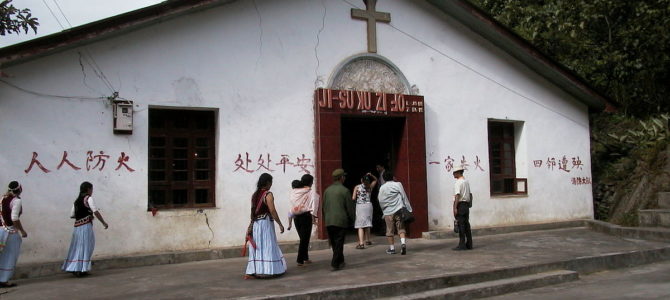
Chinese President Xi Jinping’s regime is not the first to employ a puppet church to absorb, and finally dissolve, the genuine one. In the Ukraine of the 1920s, the so-called Living Church prefigured the Catholic Patriotic Association, a creature of the Chinese Communist Party (CPC) in the 1950s. It is to this counter-church that Pope Francis bows, in effect making the Catholic Church in China a client of the CPC.
Unlike China’s Patriotic Association, the Living Church was not created by the government. It began as part of a broader reform movement—Renovationism—within the Russian Orthodox Church. Relations between the Orthodox Church and the Bolsheviks were multifaceted and tangled. The Living Church, formed in 1922, began in tension between ecclesiastical reform and issues of loyalty to Soviet aims.
Of relevance here is that the Living Church, with Soviet support, evolved rapidly into a tool of the State Political Police (GPU). It functioned within the orbit of the People’s Commissariat for Internal Affairs (NKVD), an intelligence agency charged with suppressing “counter-revolutionary activity.” In similar fashion, China’s Catholic Patriotic Association is answerable, ultimately, to the Central Committee of the CPC as its sole governing authority. The CPC’s surveillance, confiscatory, and punitive powers hang over the Patriotic Association like the sword of Damocles.
The Ultimate Goal Was Eliminating Faith Entirely
Traditional religious faith—“dross of the old society”—was necessarily as anathema to the Bolsheviks as it is to the CPC. The religion most under assault in the Ukraine was Christianity. In the judgment of both regimes, a substitute for the church, whether Orthodox or Roman Catholic, would gradually eliminate Christianity by attrition.
Atheistic Communism presumed that all religion would wither as ideological propaganda eroded the class conditions thought to produce it. Soviets had a word for the process: samotek. Xi’s analogous strategy is sinocization. In a 2015 meeting with the United Front, Xi repeated old Maoist warnings against ideological pollution from the West. Contamination resides in Christianity, seen as a Western religion.
In the Ukraine, a gradualist approach was meant to reconcile the Living Church and the patriarchal one by degrees. It was believed that Orthodox faithful would slowly, imperceptibly, accept the quisling leadership of the Living Church.
Moreover, indirection avoided alienating potential sympathizers, especially those abroad. Philip Walters, an authority in Soviet religious policy, explained: “The aim was now a form of hidden schism; the infiltration of Trojan horses within that church to which the believing population had demonstrated its continuing allegiance.”
No Private Worship, Only State-Controlled Worship
Despite intimidation, the mass of believers remained stubbornly loyal to Orthodoxy. It was the schismatic church that dwindled instead, whereupon the Soviets heightened attacks on the church, especially in the countryside against the peasantry. Offensives culminated in the rural terror of 1930-33.
Mao Zedong, repeating Soviet tactics, employed calculated schism with longer patience and better luck than the Stalinists. The church in China has been in de facto schism since the imposition of the Patriotic Association. In exchange for surrendering to the CPC’s separatist creation, Pope Francis receives the fig leaf of an illusory hold on authority no firmer than the pious boilerplate of Vatican diplomats.
Even before holy water had dried on moves toward appeasement, China’s State Administration for Religious Affairs (SARA) tightened strictures on the underground (canonically legitimate) church. Asia News, an online publication of the Pontifical Institute for Foreign Missions, follows realities on the ground. Editor Bernardo Cervellera writes of “a new Cultural Revolution”:
Just like then, it is forbidden for believers to pray even in private, in their homes. The police threaten that if they find two people praying together in their home, they will be arrested and forced to undergo re-education.
Under the new regulations on religious activities, proposed last September and implemented last February 1st, worship can only be carried out in church, at the times set by the government. Any other place is considered an ‘illegal place’ and those who break such regulations will be subject to prison, fines, expropriation of the building that houses illegal religious activity. Even private homes are now considered an ‘illegal place of worship’: in every private house religious conversation or prayer is forbidden, under threat of arrest. The faithful can pray only in [a Party-approved] church, during Sunday service.
All churches must display a sign at their entrance announcing that the building is ‘forbidden to minors under the age of 18’ must be exposed because children and young people are prohibited from participating in religious rites.
Christians are barred from government positions. Religious beliefs of any kind are forbidden to Communist Party members. To be considered “under the law,” all religions must be directed by the government. County and village authorities have the right to intervene in religious activities. Cameras have been placed at all religious sites and celebrations are subject to police checks. Denunciation, facilitated by smartphone photos, is encouraged.
Communism Isn’t So Bad, Right?
Even before the regulations became the norm on February 1, police and representatives of the Religious Affairs Bureau have been “advising” priests and lay faithful from underground communities to register. Registration with the bureau automatically implies membership in the Patriotic Association. Nevertheless, behind the Vatican wall, anti-Communism remains yesterday’s phobia, a Cold War relic unsuited to global cooperation.
To some extent, Pope Francis is simply accelerating a genuflection to the world begun by Pope John XXIII. John convened the Second Vatican Council in the very year that marked the end of Mao’s Great Leap Forward (1958-62), the deadliest reign of mass murder in recorded history.
Yet Pacem in Terris (1963) brought a manic naiveté to John XXIII’s effort to come to terms with communism and socialism. It took issue with the belief that Marxism is inherently antithetical to Christianity. While the pope named Marxism “a false philosophy,” he believed its precepts have been misinterpreted. Although things can get out of hand in practice, Communism might well hold “good and commendable elements.”
Vatican II had been convened 30 years before Soviet bloc archives were opened. The crimes—terror, deliberate famine, mass deportations, and executions—of a Marxist-Leninist state were as yet not widely known. So perhaps an excuse can be made for John XXIII’s apparent ignorance of the brutal Ukrainian genocide, the Holodomor, that took at least 11 million lives (a conservative estimate, according to historian Robert Conquest). Still, papal credence in the beneficent potential of communist systems concurrent with Mao’s atrocities is difficult to fathom.
The ‘Vivacity, Joy, Serenity’ of Totalitarianism
John XXIII was not alone. In the era of Pacem in Terris, the Great Helmsman’s prestige was strong in the West. His “Little Red Book” was second only to the Bible in global circulation. A hundred flowers bloomed in the minds of Western intellectuals, confirming Stalin’s old confidence in the gullibility of the West.
The exalted view of Mao’s achievement by two influential Italian Catholics, who traveled to China at the height of the blood-soaked Cultural Revolution, was not untypical. Gianpaolo Meucci, a Florentine jurist, and Raniero La Valle, a distinguished chronicler of Vatican II, memorialized their 1973 visit with this:
Chinese society is full of vivacity, joy, serenity. During a month-long stay in China there has never been even the most fleeting impression of the existence of a domineering police power. Even the guards at the government building, who try in every way to give themselves a martial air, appear almost ridiculous when compared with their counterparts in the West, such that in comparison with them our rookie soldiers guarding the barracks or monuments look like Nazis.
The piles of corpses did not enter their memoir.
In “Harvest of Sorrow,” Conquest emphasized what is commonly overlooked in popular treatments of the man-made famine that reduced the Ukraine to “a vast Belsen”: The so-called kulaks, designated a class enemy, were predominantly Orthodox. Dekulakization doubled as a means of dechristianization. Conquest wrote:
A major concerted assault on the churches began in late 1929, and came to a climax in the first three months of 1930. . . .Dekulakization was the occasion for attacks on the church and the individual priest. A party view was that ‘The church is the kulak’s agitprop.’ . . . Collectivization usually involved the closure of the local church as well. Icons were confiscated as a matter of routine and burned along with other objects of religious worship. . . . Bell seizure and church closure went hand in hand.
Similarly, Xi’s sinocization is functional dechristianization. It takes a cue from Lenin, whose famous letter to Maxim Gorki referred to the idea of God as “contagion of the most abominable kind.” With all clergy subject to orders from the CPC, the church will be reduced to promoting the regime’s political and economic agendas. It will be crippled in making the truth claims that distinguish it from Meals on Wheels or any other social service organization.
Unlike John XXIII, Pope Francis cannot be thought innocent of the full spectrum of communism’s monstrous means toward material ends. But he has set about annihilating distinction between secular and spiritual ends, an erasure apparent in his gospel-coated embrace of environmentalism and the tropes of climate change.
In their forward to “The Black Book of Communism” (1999), the authors write that in the contemporary age “morality is not primarily a matter of eternal verities or transcendental imperatives. It is above all a matter of political allegiances. That is, it is a matter of left versus right . . . .”
The mission of the Christian church is not political. And diplomacy has value only insofar as it facilitates the church’s mission. But Francis, a man of his time and of the Left, has made politics into an idol. To every idol sacrifice must be offered. The Chinese faithful are first on the pyre.









